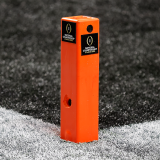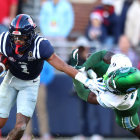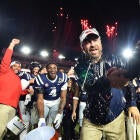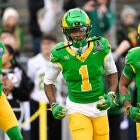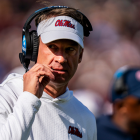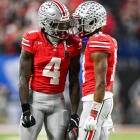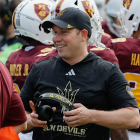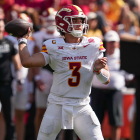NIL landscape in college sports changing: NCAA losing its grip, amateur vs. employee battle looms
The developments regarding NIL and/or player compensation that are worth tracking in 2024

College athletics is inching closer to a professionalized model only three years after name, image and likeness laws in several states made it possible for players to be compensated.
In an effort to convey what has happened and what's next in the NIL space, CBS Sports provides an explainer of the latest developments and what might be next as state laws continue to evolve across the country. Below this article is an FAQ-style interview CBS Sports conducted with sports lawyer Darren Heitner, founder of HEITNER LEGAL, who provides an easy-to-digest breakdown of NIL and what to expect in the coming weeks, months and years.
But first, let's look at what has happened in recent months.
What is NIL?
NIL stands for name, image, and likeness, which are important elements that make up an individual's right of publicity. The right of publicity was conceptualized only a century ago and is not uniform throughout the 50 states. At its core, these rights are intended to provide economic relief for individuals who have their persona used by others, in a commercial manner, without their consent. Alternatively, they are recognized rights that individuals may freely exploit for commercial purposes.
Court battles continue to loosen NCAA's grip
Multiple lawsuits and legal wrangling have forced the NCAA's hand -- and led to some roadblocks -- as NIL deals become more prevalent. The NCAA loosened rules Monday, approving legislation that allows schools to facilitate NIL deals between players and third parties directly.
A lot has changed in the NIL space since players were legally allowed in July 2021 to begin benefiting financially. NCAA president Charlie Baker proposed in December a plan that would allow schools to pay players directly for their NIL, though talks have softened as the landscape continues to change from state to state as the NCAA also faces a rash of court injunctions and legal threats. At the forefront is a massive class-action lawsuit that could lead to the NCAA and its conferences paying former players as much as $4.2 billion in back pay for NIL.
Will players soon be labeled as employees?
Meanwhile, many believe college athletics is approaching a student-employee model. In February, a judge ruled that Dartmouth's men's basketball players should be deemed college employees. The National Labor Relations Board has also taken the NCAA, Pac-12 Conference and USC to court, arguing football and basketball players at USC should be classified as employees.
NIL laws continue to change countrywide, with some blurring lines between NIL collectives and athletic departments. NIL collectives help facilitate deals for players in exchange for endorsement opportunities, and several schools have launched collectives tied directly to their athletic foundation.
The state of Virginia has opted to erase the separation of schools and NIL contracts. The state signed a law in April allowing schools to pay players directly for their NIL rights. The law will go into effect on July 1. The NCAA currently prohibits schools from paying players via NIL deals, but several schools in Virginia are expected to take advantage of the new state law and ignore the NCAA's rules this summer. Still, some continue to hold onto the thinking that athletes should not be employees, and should only benefit through NIL deals tied to marketing. Virginia's state law allows schools to pay players, but it also explicitly states they are not employees.
National NIL law is still a dream
Creation of a nationwide NIL law has yet to leave committee chambers in Washington D.C., with nearly one dozen efforts falling short of a vote. Some states, including Tennessee and Virginia, have either fought the NCAA in the courtroom or signed laws that blatantly ignore NCAA guidelines as well. At least five states have passed state laws prohibiting the NCAA from penalizing schools in regard to NIL: Arkansas, Missouri, New York, Oklahoma and Texas.
The NCAA DI Council recently adopted a proposal allowing schools to increase NIL support for players, including facilitating deals between players and third parties. What does this mean exactly?
Heitner says: It means that schools will be able to identify NIL opportunities and be involved in discussing the details, including compensation. This primarily affects coaches, who were already often involved in the negotiation of deals, to have an overt and transparent role as an intermediary between NIL collectives and athletes who are either already enrolled at the school or are considering enrollment. It also allows anyone at the school to help procure deals with brands outside of collectives and boosters.
A Tennessee judge ruled in February that the NCAA can not enforce rules prohibiting players from negotiating and signing deals before enrolling at a college. At root here is using NIL as an inducement to attend a certain college. If that is legal, does this make the NCAA toothless in its pursuit to punish schools or players in any NIL investigation? If not, what breaks NCAA rules?
Heitner says: It does not make the NCAA toothless to pursue any NIL investigation but certainly concerns the prong of its original NIL policy, which intended to prohibit this type of "inducement" activity. The NCAA has already stated that it will table any investigations that have commenced related to same. It does not preclude the NCAA from continuing investigations or commencing investigations related to other "guardrails," such as that NIL deals must include quid pro quo, compensation cannot be conditioned on performance, and schools cannot pay players directly. The latter prohibition is one to keep an eye on with Virginia now signing a bill to become law that says schools in the state will be able to directly compensate players for the NIL rights in the future.
Laws regarding NIL differ from state to state, but many are similar. How different are they in some states, and what advantages and disadvantages do they provide schools and players?
Heitner says: The main difference between NIL laws state-by-state is based on how far the state is willing to push the envelope to supersede restrictions implemented by the NCAA. Virginia's amended NIL law goes the furthest, stating that the NCAA cannot prevent a school from directly compensating athletes in exchange for the use of their NIL. Other states had mechanisms to avoid NCAA punishment for improper inducements, but with the Tennessee judge preliminarily enjoining the NCAA's enforcement of that rule, most states are on an equal playing field.
Why isn't there a national law regulating NIL? Will there ever be a national NIL law?
Heitner says: It all boils down to politics and an inability for Republicans and Democrats to come together on bipartisan legislation. While we have recently seen some legislation proposed that is labeled "bipartisan," it is going to take a lot more than a couple of people on both sides of the aisle to reach a consensus.
What is the next development we should monitor concerning NIL and/or player compensation?
Heitner says: I would keep an eye on a few things.
(1) Does Congress ever pass legislation on the subject and will it include a section that affirmatively labels college athletes as not being employees?
(2) What happens with the appeal on the Dartmouth basketball players' effort to unionize and collectively bargain for working conditions?
(3) What will be the NLRB's decision in the pending action concerning UCLA and USC athletes?
(4) Does Charlie Baker's proposal to allow colleges to directly compensate athletes for their NIL rights ever get passed?
(5) How many states decide to follow in Virginia's footsteps and modify their NIL laws to allow schools to directly compensate athletes for their NIL rights despite an NCAA prohibition on same?
(6) Will any pending lawsuit lead to a court's determination that athletes have been misclassified as not being employees, and what will be the economic consequences?





